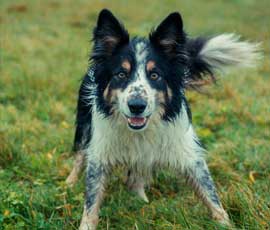Tips to keep your pets safe from dognapping

A highly trained sheepdog or gundog can be an important member of a farm’s workforce, but increasing numbers are being stolen.
Adult working dogs including pointers, springer and cocker spaniels, Labradors, retrievers and setters can be resold for £800-2,000 by unscrupulous thieves.
Jean Arnott of H&H Insurance Brokers offers 10 timely tips on how to reduce the risk of this happening to you and suggests what to do if it does.
1 Ensure your kennel is secure
Many thieves are aware of the fact that working dogs are kept outside the home. Therefore it may be wise to fit CCTV in the area that they’re kept or to even fit noisy bolts and chains which will draw attention if somebody is trying to break into the kennels. Think about installing movement-censored lighting – a relatively small measure like this could potentially put off someone who is not supposed to be on your land. You can also get noise alarm padlocks for gates.
2 Microchipping
If you haven’t thought about this already, talk to your local vet about the option of having your dog microchipped. Also, if anyone shows interest in buying your dog, ensure that you have the correct name, address and telephone number for the potential buyer. Check details against the phone book or electoral roll and phone a landline to speak to a potential purchaser.
3 Be assertive
If you happen to see anything suspicious happening in your area, report it to your local police (the new non-emergency number is 111) and if you are a member of a farm watch-type group make sure anything out of the norm is reported to your local representative.
4 Pay attention
Make sure that when you are out with your dog you keep an eye out for its whereabouts at all times. Try to keep your dogs as close as possible as you can. If something goes wrong, report the incident immediately. Make sure that if your dog has a collar that it has a tag with your contact details noted in it.
5 Take a close note of your dog’s appearance
In the event that you may have to report a loss to the police, try to describe your dog as fully as possible. Provide essential details as the sex, colour, size, height, breed, scars and any distinguishing marks. Remember to provide as much information as possible about the breed. It is a good idea to take some clear photos, which will make it easier to report.
6 Spread the word
In the unfortunate situation that your dog does go missing, don’t hold back on spreading the word. Create flyers, speak to as many people as possible and get in contact with your local newspaper or radio – you never know who may have seen something which could help. This will also make other owners aware that thieves are operating in the area.
7 Stay savvy
Remain aware that there are people out there who will take advantage of your misfortune and may see this as an opportunity to gain money. Avoid posting any reward money until you have your dog back and never go to pick up a dog alone.
8 Use today’s modern facilities
Don’t be afraid to use the power of modern technology. There are a number of websites, forums, blogs and even social media sites that aim to help communities keep their working dogs safe. Have a look at these and look out for anything suspicious happening in your area.
9 Insure your pet
Make sure you have taken out adequate insurance on your working pet. With some covers, it may be that your working pet will be covered under the livestock section. Ensuring you have the best cover will not cover the emotional burden, however companies such as H&H Insurance Brokers can tailor insurance cover on your working pet as part of the bigger farming contract which will help with the financial burden of losing a pet.
10 Keep your personal details private
If you are thinking of selling your dog, keep personal details such as your home address and home telephone number private. Use details such as your email address or mobile number as your contact details and, if you go to meet a perspective buyer, make your meeting point somewhere neutral and public. Don’t give details about where you live as you may be giving a thief details you may later regret.
* Jean Arnott is senior area development manager (Scotland) with H&H, one of the country’s leading independent agricultural insurance brokers. More details at www.hhinsurancebrokers.co.uk

